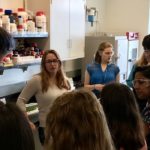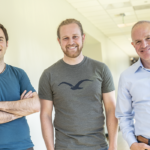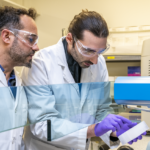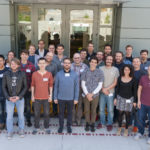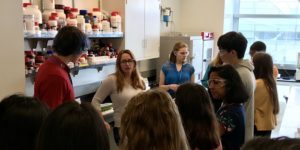 The National Student Leadership Conference (NSLC) visited JBEI on July 17. NSLC is a nonprofit, nonpartisan, education organization which brings together high school students for fast-paced, high-level, interactive summer sessions. For a fifth year in a row JBEI and NSLC partnered to instruct students about the benefits and research behind biofuels and bioproducts.
The National Student Leadership Conference (NSLC) visited JBEI on July 17. NSLC is a nonprofit, nonpartisan, education organization which brings together high school students for fast-paced, high-level, interactive summer sessions. For a fifth year in a row JBEI and NSLC partnered to instruct students about the benefits and research behind biofuels and bioproducts.
Faster, Cheaper, Better: A New Way to Synthesize DNA
Breakthrough discovery at the Joint BioEnergy Institute could greatly accelerate the pace of science
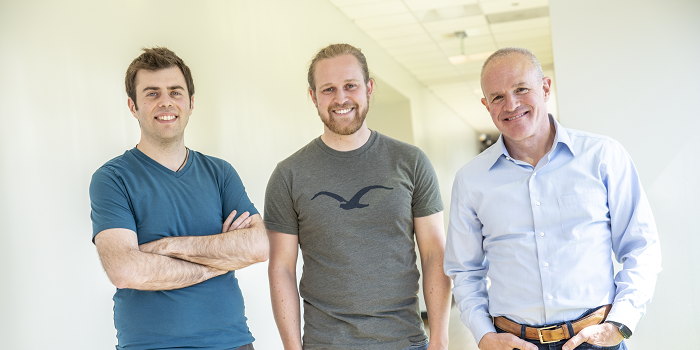 In the rapidly growing field of synthetic biology, in which organisms can be engineered to do things like decompose plastic and manufacture biofuels and medicines, production of custom DNA sequences is a fundamental tool for scientific discovery. Yet the process of DNA synthesis, which has remained virtually unchanged for more than 40 years, can be slow and unreliable.
In the rapidly growing field of synthetic biology, in which organisms can be engineered to do things like decompose plastic and manufacture biofuels and medicines, production of custom DNA sequences is a fundamental tool for scientific discovery. Yet the process of DNA synthesis, which has remained virtually unchanged for more than 40 years, can be slow and unreliable.
Now in what could address a critical bottleneck in biology research, researchers at the Joint BioEnergy Institute (JBEI), announced they have pioneered a new way to synthesize DNA sequences through a creative use of enzymes that promises to be faster, cheaper, and more accurate. The discovery, led by JBEI graduate students Sebastian Palluk and Daniel Arlow, was published in Nature Biotechnology in a paper titled “De novo DNA Synthesis Using Polymerase-Nucleotide Conjugates.” Read the Berkeley Lab News Center feature story.
New Machine Learning Approach Could Accelerate Bioengineering
Héctor García Martin and Zak Costello, scientists affiliated with the DOE Agile BioFoundry, the Joint BioEnergy Institute (JBEI), and the Biological Systems and Engineering Division have developed a way to use machine learning to dramatically accelerate the design of microbes that produce biofuel.
Their computer algorithm starts with abundant data about the proteins and metabolites in a biofuel-producing microbial pathway, but no information about how the pathway actually works. It then uses data from previous experiments to learn how the pathway will behave. The scientists used the technique to automatically predict the amount of biofuel produced by pathways that have been added to E. coli bacterial cells. The research is published online in Nature Partner Journal Systems Biology and Applications. Read the Berkeley Lab News Center feature story.
Biosciences Researchers Honored by the National Academy of Sciences
Three scientists affiliated with the Biosciences Area have been recognized by the National Academy of Sciences (NAS), one as the recipient of an NAS award and two as newly elected members. On Sunday, the NAS formally presented its 2018 NAS Award in Chemical Sciences to Jennifer Doudna, a faculty biochemist in the Molecular Biophysics and Integrated Bioimaging (MBIB) Division. Judith Campisi, a biochemist affiliated with Biological Systems and Engineering Division, Ehud “Udi” Isacoff, an MBIB faculty biologist, are among the group of 84 new members elected to the NAS.
Lab Hosts ‘Neurodata Without Borders’ Hackathon
Berkeley Lab played host to 31 neuroscience experts from across the country who came to participate in the fifth Neurodata Without Borders: Neurophysiology (NWB:N) project hackathon. The event was organized locally by Computing Sciences Area researchers Oliver Ruebel and Andrew Tritt, and Biosciences’ Kristofer Bouchard, a computational biologist in Biological Systems and Engineering (BSE).
- « Previous Page
- 1
- …
- 29
- 30
- 31
- 32
- 33
- …
- 62
- Next Page »
Was this page useful?


